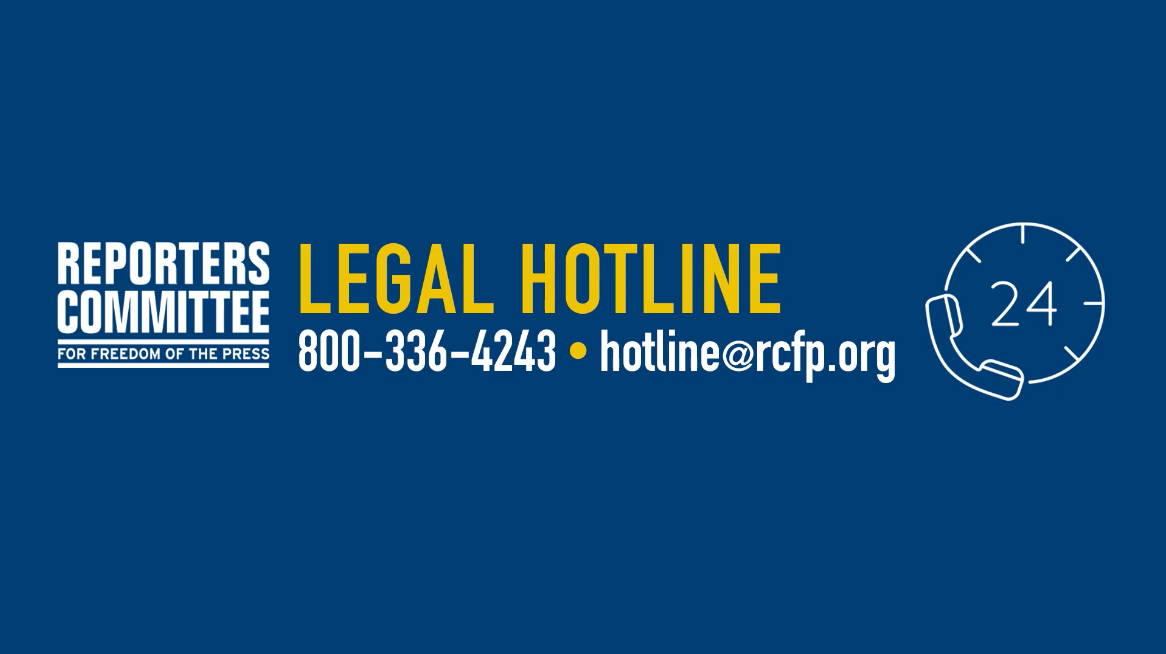Why journalists return to RCFP’s free Legal Hotline — again and again

When local Tennessee school board elections became partisan in 2022, Main Street Media editor Ivan Aronin said board members started acting more like politicians than policymakers. That’s when he noticed an uptick in county officials shutting reporters out of public meetings about controversial issues, he said.
In response, Aronin contacted Paul McAdoo, the Reporters Committee’s Local Legal Initiative attorney for Tennessee, for free legal support.
He said McAdoo helped Main Street Media advocate for access to meetings where members of a book review committee considered recommending a ban on certain books from school libraries. After McAdoo emailed county officials informing them of their obligation to hold the meetings in accordance with Tennessee’s Open Meetings Act, Aronin said the committee opened the meetings to the public.
“It was a very important step in the process of knocking down that wall,” Aronin said.
Aronin is one of many journalists who have come back to the Reporters Committee again and again for free legal guidance — either through RCFP’s free Legal Hotline or by directly contacting Local Legal Initiative attorneys in their state — to help overcome reporting obstacles or respond to threats to their newsgathering and First Amendment rights.
This election season, the Reporters Committee is providing expanded support for the hotline to respond to the legal needs of journalists covering the political conventions, as it has every election cycle since 1972. Journalists who contact the hotline can expect to receive general guidance on media law and press freedom issues and, if necessary, a connection with a local attorney for free or low-cost legal representation.
It’s an “immensely important” resource, said Paige Pfleger, a criminal justice reporter at WPLN News, Nashville’s NPR station, and a local reporting fellow for ProPublica.
Pfleger first reached out to McAdoo in 2021, when a prosecutor demanded she provide a raw interview tape for a trial. McAdoo wrote a letter to the prosecutor on Pfleger’s behalf that helped her successfully challenge that request. Ever since, Pfleger said she regularly seeks McAdoo’s advice on legal issues she confronts in her reporting.
With his help, for example, Pfleger obtained public records from dozens of law enforcement agencies that revealed how Tennessee’s weak gun laws sometimes fail to protect domestic violence victims.
“It’s been incredibly helpful as a reporter to have someone with that amount of knowledge who is game to just answer your questions whenever they come up,” she said.
Pfleger said McAdoo’s free legal support has not only helped her get access to records that were rightfully available under the law, it’s also had a ripple effect on her newsroom. Equipped with the knowledge McAdoo has shared with her, she’s been able to help her colleagues obtain public records for their reporting.
“We wouldn’t be able to do what we do without people like Paul and other folks at the Reporters Committee,” Pfleger said.
Dan Schwartz, a freelance journalist, said he’s used the Reporters Committee’s free Legal Hotline for guidance on how to respond to potential legal threats intended to intimidate him or stifle his reporting.
“Having access to RCFP is an incredible resource for, one, poorly resourced newsrooms, and, two, freelancers like myself,” Schwartz said. “I mean, it’s a huge peace of mind, just speaking personally, to know that I can contact RCFP.”
Halle Stockton, executive director and editor-in-chief of the nonprofit PublicSource, can relate.
She has relied on Paula Knudsen Burke, the Reporters Committee’s Local Legal Initiative attorney for Pennsylvania, for help navigating legal threats that could chill her newsroom’s reporting. Journalists might confront more of those threats as the election nears, and if they do, she said, they shouldn’t hesitate to reach out to the hotline.
“You can go to RCFP to get a gut check on, ‘What’s an actual threat and what’s not?,’ and, ‘How do we mitigate our risk and protect not only ourselves and our organizations, but a free press?’” Stockton said.
The Legal Hotline is just one of the many free legal resources that the Reporters Committee is providing to journalists during the 2024 election season. Visit the Reporters Committee’s 2024 conventions resources and tips page for more information.
The Reporters Committee regularly files friend-of-the-court briefs and its attorneys represent journalists and news organizations pro bono in court cases that involve First Amendment freedoms, the newsgathering rights of journalists and access to public information. Stay up-to-date on our work by signing up for our monthly newsletter and following us on Twitter or Instagram.